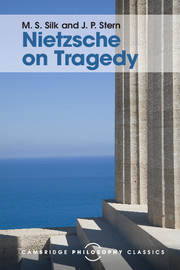Book contents
- Frontmatter
- Dedication
- Epigraph
- Contents
- Preface to this edition
- Preface
- Note
- 1 Germany and Greece
- 2 Biographical background I: Nietzsche and his early interests
- 3 Biographical background II: the genesis of The Birth of Tragedy
- 4 The argument of The Birth of Tragedy
- 5 The aftermath
- 6 Nietzsche's account of Greece
- 7 Mode and originality
- 8 Tragedy, music and aesthetics
- 9 Nietzsche and earlier German theories of tragedy
- 10 Style and philosophy
- Bibliography
- Index
Preface to this edition
Published online by Cambridge University Press: 05 August 2016
- Frontmatter
- Dedication
- Epigraph
- Contents
- Preface to this edition
- Preface
- Note
- 1 Germany and Greece
- 2 Biographical background I: Nietzsche and his early interests
- 3 Biographical background II: the genesis of The Birth of Tragedy
- 4 The argument of The Birth of Tragedy
- 5 The aftermath
- 6 Nietzsche's account of Greece
- 7 Mode and originality
- 8 Tragedy, music and aesthetics
- 9 Nietzsche and earlier German theories of tragedy
- 10 Style and philosophy
- Bibliography
- Index
Summary
Friedrich Nietzsche began his career as a professor of classical philology, but his first book was hardly scholarly. To specialists The Birth of Tragedy, first published in 1872, was exasperating from the start, though touched with genius. Just over a century after its first publication it remained difficult to sort out Nietzsche's insight into the Greek mentality from a celebration of his own. The incisive German style, with its idiosyncratic poetry and deep grounding in philosophy, made the critics' task still harder.
So they wrote the book's biography, starting with a brief life of its author. From a clerical background, he had been a pupil at the Pforta school in Saxony, famous for its teaching of Greek and Latin. The university of Basle appointed this brilliant student professor of classical philology at the age of 24. Nietzsche subsequently lectured on the origins of Greek tragedy, and its sudden decline, and from there ambition drove him to imagine a book.
In the two and half years that passed between inspiration and publication, Germany became a united country, and Nietzsche met the composer Richard Wagner. A vision for the future now wove itself through the properly named Birth of Tragedy out of the Spirit of Music. Wagner's music, haunted by the metaphysics of Schopenhauer, freighted with intense human emotion, seemed to Nietzsche at once to revive the old Greek tragic spirit in art, and to suggest a new German culture that would be an antidote to present-day superficiality.
The book was badly received by specialists. Nietzsche's favourite professor, and the sponsor of his brilliant early career, was too irritated to comment, and an old rival in classical studies penned an attack that would shape the views of informed readers, in both Germany and the anglophone world, for generations to come.
Nietzsche's hunger for a wholeness of experience, what he imagined the ancient Greeks to have enjoyed, was fundamental to a book that some likened to a didactic poem. Nietzsche challenged the understanding established by the eighteenth-century archaeologist J. J. Winkelmann that Greekness meant ‘noble simplicity and serene greatness’, for that was already one-sided.
- Type
- Chapter
- Information
- Nietzsche on Tragedy , pp. ix - xPublisher: Cambridge University PressPrint publication year: 2016



